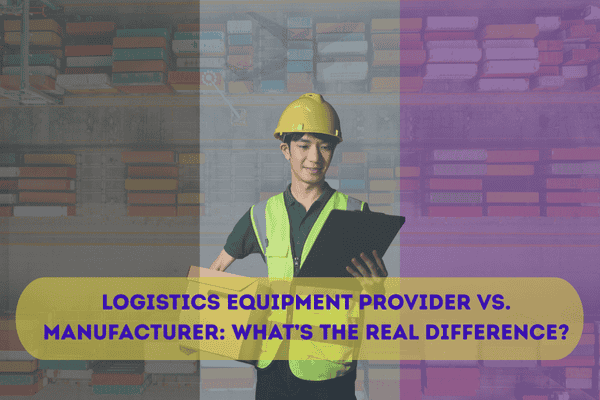
When an industrial user needs to source logistics equipment, they face numerous challenges. A primary challenge is selecting a manufacturer. Confusion starts when one doesn’t know the difference between a logistics equipment supplier and a provider. These two types differ when examined in detail. To eliminate any confusion and ensure a smooth purchase process, simply refer to this guide.
From its name, you can understand what it does. However, the terms can often be confusing, so here is everything in detail to make things easier to understand.
A manufacturer always provides OEM service. That means you will receive direct production from a manufacturer without any third-party involvement. They can offer bulk production of logistics equipment depending on the type. Moreover, the prices are very low because they deal in low-cost production.
You can find manufacturers that specialize in a few types of equipment. For instance, you can find manufacturers that offer a range of equipment, including forklifts, loaders, and conveyor machines, among many other options. At the same time, some manufacturers provide only forklifts or different types. However, the production will be authentic, and the supply will come directly from the factory.
A manufacturer has the advantage of research and development, which is why they can offer you unique services. These services include customization tailored to the specific requirements of buyers. A manufacturer can make changes to features because it has R&D and innovation capabilities. You can ask them to manufacture logistics equipment with custom functions.
A manufacturer will directly supply equipment to the consumer. Retailers and industrial consumers can purchase logistics equipment directly from the manufacturer without involving a third party. It saves time, reduces costs, and eliminates confusion from the buying process.
You will receive a warranty from the manufacturer when you purchase any equipment. They will provide after-sales services, including repair and similar services. The manufacturer provides these supportive services, whether you are buying a large or small piece of equipment.
Then comes a similar term, which is entirely different from the manufacturer. It is also known as a third-party logistics provider. What makes it different from a manufacturer is these factors.
A logistics equipment provider has multiple options for you, whether you want to lease, rent, or buy equipment. Since they have a list of many manufacturers, they can provide a solution tailored to your needs and affordability.
You can also get new and used equipment from them. They have more varieties because a 3PL/logistics equipment provider is like a middle party. You can obtain equipment from various brands on the same platform. It is like a one-stop solution for buyers. However, you cannot get customized production because only a manufacturer can provide that.
Since a 3PL provider is like a middle party, you will have to pay slightly more for the equipment. It is the cut or fee of the provider that will make a difference. Since you are not purchasing directly from a manufacturer, you will need to pay for the services provided by a third-party logistics (3PL) provider. Therefore, a 3PL provider relies on the manufacturer to supply your order.
The last is the size of MOQs, which is typically less than what a manufacturer can handle. A logistics equipment provider will normally offer smaller minimum order quantities (MOQs) due to their high reliance on the manufacturer. Such platforms have multiple manufacturers, but they lack the massive minimum order quantities (MOQs) that are typically required. However, it could be an advantage for small businesses who want to buy from a 3PL provider instead of a bulk manufacturer. Since a bulk manufacturer has a minimum order quantity (MOQ) limit, this 3PL provider could be a good option for small businesses.
These were the differences between a logistics equipment provider and a manufacturer. One has complete authority over production, price, and customization, while the other must rely on manufacturers to confirm the order size, equipment type, and delivery options. However, both are reliable options depending on your requirements.